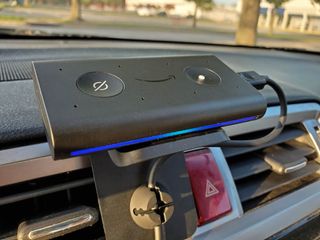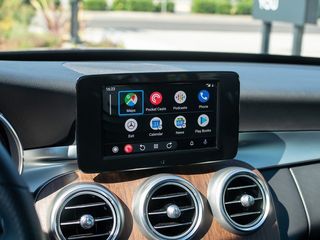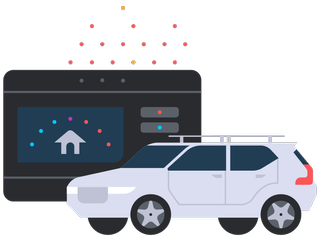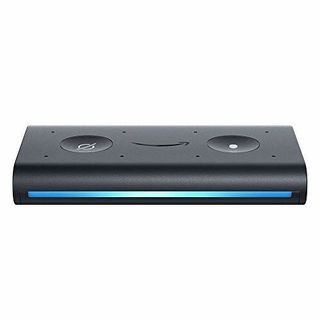CES 2020 shows we might finally be ready to make Alexa our copilot

For several years now I've longed for the heads up displays (HUDs) and infotainment systems that I'd see in my rental cars or from my friends' rides that have built-in Android Auto or Apple CarPlay, and I've vowed that my next vehicle will have something like that. However, what I really want is the option to have either of those two great platforms and/or access to my favorite voice assistant, Alexa.
My car is by no means old, but it doesn't have a real infotainment system, so I currently alternate between an Echo Auto and a Roav Viva. These devices work fine as a voice portal to Alexa, but they're essentially just operating through Bluetooth (which can be spotty), and their overall functionality is ultimately underwhelming compared to the aforementioned options from Google and Apple. I argued recently for Amazon to dive back into the smartphone game, and I think it also need to dive headfirst into the auto experience. Thankfully, signs from CES 2020 point to that happening sooner rather than later.
The current state of smart infotainment systems

First, let's take a look at what is out there right now when it comes to HUDs and infotainment systems. For years auto manufacturers have stubbornly built in their own systems or lightly-customized, generic, off-the-shelf units, leading to largely unsatisfactory experiences. There are some bright spots, such as Tesla and BMW, but for the most part, it's a mixed bag.
Enter Apple's CarPlay (2014) and Google's Android Auto (2015). These systems project a skinned-down version of iOS or Android onto a compatible vehicle's existing infotainment system for basic touch access to maps and music, and voice access to calling, messaging, and a few more simple, but essential, features. For the most part, the two auto OS's have been evenly matched, though they often butt heads in terms of feature sets and user satisfaction. There is a great series comparing these two from The Straight Pipes over on YouTube, but for great in-depth coverage, you just can't go wrong with my colleague Phil Nickinson.
The current state of Alexa in the car
Aside from the lackluster plug-and-play Echo Auto, Roav Viva, and other similar offerings by companies like Garmin, Amazon is actually working on bringing its voice assistant and entertainment platform(s) into the car.
Plug-and-play devices like the Echo Auto ain't it chief.
The company has had a team working with automakers for years on the Alexa Auto SDK (software development kit), and it currently has partnerships with a number of premium car companies to integrate Alexa into their infotainment systems, including Audi, Ford, Lexus, Lincoln, Seat, and Toyota, and Volkswagen. General Motors has also said that it will be bringing Alexa to the infotainment systems in several of its vehicles (from 2018 and beyond), including Chevrolet, Buick, GMC, and Cadillac. Even more automakers have connected car skills for Alexa to "talk to" and interact with their vehicles, such as BMW, Buick, Cadillac, Dodge, and Hyundai.
What's coming according to CES 2020

At CES 2020 we heard about some progress on bringing Amazon's infotainment solutions into the car. Early in the week, we learned that BMW and Fiat Chrysler will be adding Fire TV to their upcoming vehicles (presumably for backseat entertainment) and also that Automobili Lamborghini and electric truck manufacturer Rivian (which Amazon has an investment in) will be integrating Alexa into some of their premium vehicles, even with some offline capabilities.
Be an expert in 5 minutes
Get the latest news from Android Central, your trusted companion in the world of Android
Perhaps one of the more interesting Alexa-in-the-car stories to come out of CES 2020 was the ability for customers to ask Alexa to pay for their gas at over 11,000 Exxon and Mobil gas stations, thanks to a partnership between the Alexa team, Amazon Pay, and Fiserve.
Hope down the road?

There are no doubt many reasons why Alexa isn't more popular as an infotainment option (heck, despite their mindshare, even Android Auto and Apple CarPlay aren't close to being ubiquitous). Some of this has to do with the slow upgrade cycle for vehicles, but more has to do with the various agreements, contracts, and squabbles between the auto manufacturers, suppliers, and the tech companies themselves.
Ultimately what I'd love to see is more automakers working with the tech giants to create infotainment systems that can work with nearly all voice assistants. Think Amazon's proposed Voice Interoperability Initiative married with the new Project Connected Home over IP (or CHIP) and repurposed for the car/plane/train, etc. How cool would that be?
Aside from infotainment and mobile assistance, one can also imagine a future where Alexa moves out of the copilot seat and firmly into the driver's seat. Amazon already owns a stake in Rivian, and we know that companies like Tesla and Waymo, among others, are working on self-driving cars. Could the next step in the Alexa Auto SDK evolution be driverless vehicles? At this point, it wouldn't surprise me at all.
CES 2020: The biggest news and announcements so far

This will have to do for now.
The Echo Auto can't do nearly as much as a fully-fledged infotainment system like Android Auto, but it does allow you to bring Alexa functionality with you on the go, and that's a start!

Jeramy was the Editor-in-Chief of Android Central. He is proud to help *Keep Austin Weird* and loves hiking in the hill country of central Texas with a breakfast taco in each hand.
